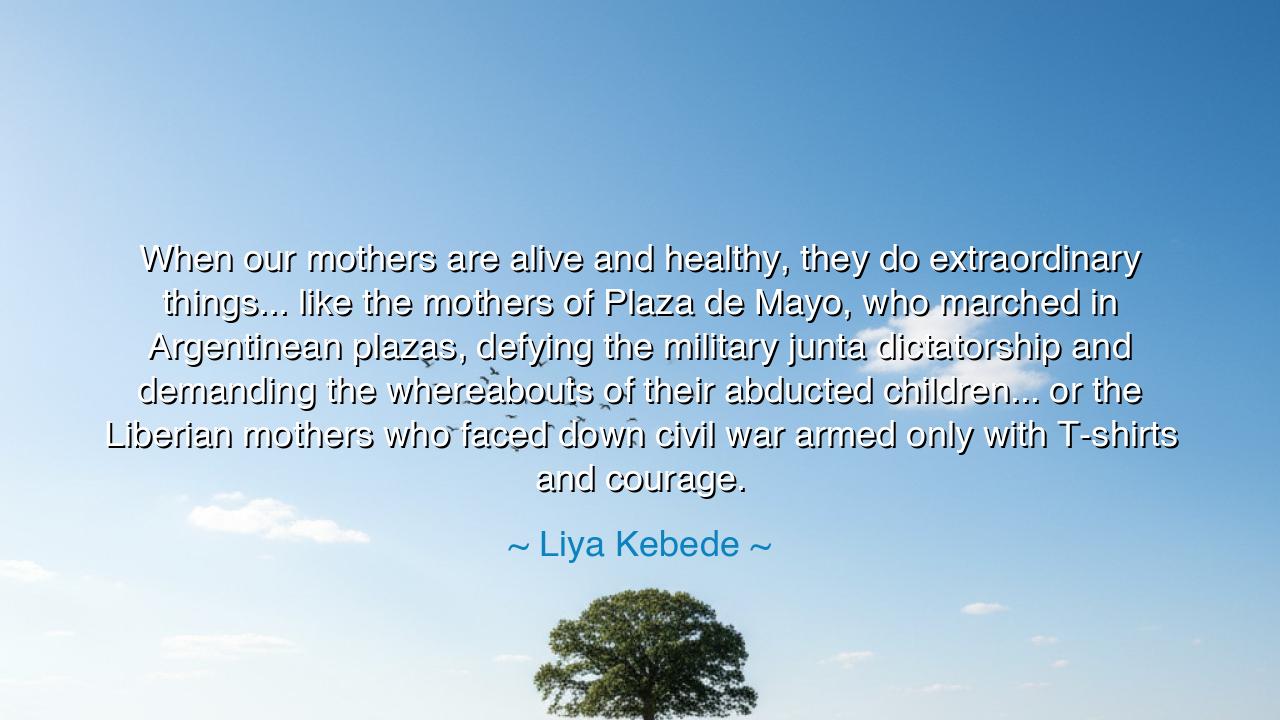
When our mothers are alive and healthy, they do extraordinary
When our mothers are alive and healthy, they do extraordinary things... like the mothers of Plaza de Mayo, who marched in Argentinean plazas, defying the military junta dictatorship and demanding the whereabouts of their abducted children... or the Liberian mothers who faced down civil war armed only with T-shirts and courage.






“When our mothers are alive and healthy, they do extraordinary things... like the mothers of Plaza de Mayo, who marched in Argentinean plazas, defying the military junta dictatorship and demanding the whereabouts of their abducted children... or the Liberian mothers who faced down civil war armed only with T-shirts and courage.” — Liya Kebede
In these powerful and luminous words, Liya Kebede, model, humanitarian, and advocate for maternal health, honors the sacred strength of motherhood — that quiet, eternal power that stands unarmed before tyranny and yet cannot be defeated. Her words remind us that when mothers live in health and freedom, their love becomes a force that shapes nations and redeems generations. For the mother is not merely a nurturer of children; she is the first defender of life, the moral backbone of humanity itself. When mothers act with courage, they summon the conscience of the world.
The origin of this quote lies in Kebede’s deep commitment to global maternal health and the recognition of mothers as agents of transformation. As an advocate for the World Health Organization and founder of the Liya Kebede Foundation, she has witnessed both the fragility and the magnificence of motherhood in the face of adversity. Her words are born from reverence — for those mothers who, rather than collapsing beneath grief and hardship, rise and do extraordinary things. They remind us that the vitality of women is not merely a social matter; it is the heartbeat of progress itself.
When Kebede invokes the Mothers of the Plaza de Mayo, she recalls one of the most sacred acts of resistance in modern history. During Argentina’s Dirty War (1976–1983), the military junta abducted and “disappeared” tens of thousands of citizens — among them the sons and daughters of ordinary women. These mothers, clad in white headscarves embroidered with their children’s names, gathered every Thursday in the Plaza de Mayo, the square before the presidential palace. There, they marched in silence, demanding to know the fate of their children. They risked arrest, torture, and death — yet they persisted. Their courage pierced through the fear that held an entire nation captive. The dictatorship tried to erase lives; the mothers restored their memory to history.
And then Kebede turns our gaze to another example — the Liberian mothers, led by women like Leymah Gbowee, who faced down the horror of civil war in the early 2000s. These women, dressed in white T-shirts, stood unarmed before soldiers, rebels, and politicians, demanding peace. They organized prayers, protests, and sit-ins; they refused to leave until their country’s leaders ended the bloodshed. Against all expectation, they succeeded — forcing the men of war to the peace table and ushering in the election of Africa’s first female president, Ellen Johnson Sirleaf. These mothers, armed only with courage, reshaped the destiny of a nation.
Both the Argentine and Liberian mothers embody the truth that the strength of a mother is the strength of life itself. When a mother grieves, she grieves not only for her child, but for the soul of humanity. When she resists, she resists in the name of all who have lost their voice. Kebede’s words, then, are not simply praise — they are a warning to us all: a society that silences or neglects its mothers weakens its own foundation. To empower mothers is to empower peace; to abandon them is to invite the collapse of compassion.
The lesson that flows from Kebede’s reflection is both profound and practical. We must honor mothers not only with words but with action — by ensuring their health, their safety, their education, and their right to speak. A mother’s life is not her own alone; it is the vessel of generations. Every hospital built, every law passed, every act of justice that protects a woman’s life is a monument to humanity’s survival. For as Kebede reminds us, a living, healthy mother is a miracle in motion — capable of healing wounds deeper than nations and of raising courage where fear once reigned.
So, O listener, remember this truth: the courage of mothers is the quiet engine of history. They are the unseen builders of peace, the guardians of love, the ones who face cruelty with bare hands and unbroken hearts. When you see a mother, you see the strength that has carried civilizations through darkness. Cherish her. Protect her. Listen to her. For when the voices of mothers rise — whether in the plazas of Argentina, the streets of Liberia, or the homes of every city and village — the world itself is reborn in their light.






AAdministratorAdministrator
Welcome, honored guests. Please leave a comment, we will respond soon